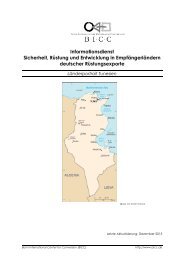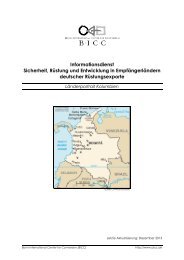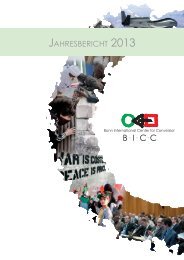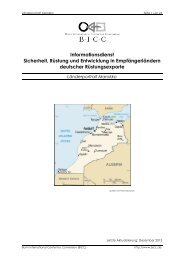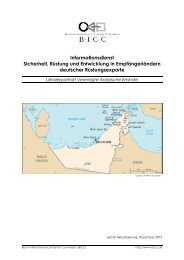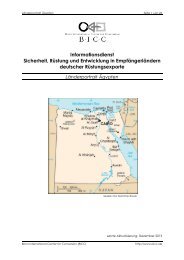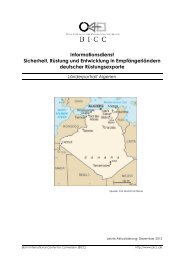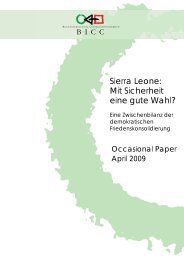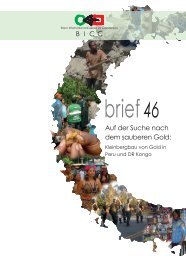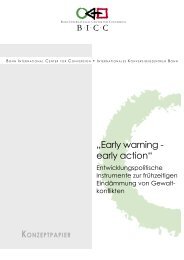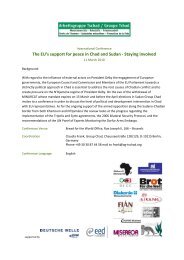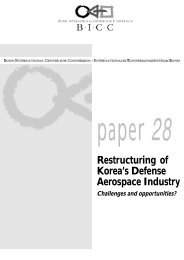English - BICC
English - BICC
English - BICC
Create successful ePaper yourself
Turn your PDF publications into a flip-book with our unique Google optimized e-Paper software.
facilitated by the United States, and<br />
especially those that involve Ireland;<br />
they doubt their capacity for<br />
impartiality. Several channels of<br />
communication were opened between<br />
the Dublin government, the Ulster<br />
Unionists and even the Loyalist<br />
paramilitaries in the mid-1990s to<br />
overcome these reservations and build<br />
confidence; however, these efforts<br />
dissipated during the post-Agreement<br />
period, leading to a renewal of<br />
sentiments of alienation among<br />
Protestants (Fitzduff, 2001, p.115).<br />
They clearly expressed their fear of<br />
possible joint authority exercised by an<br />
ever-strengthening London-Dublin<br />
axis, which they perceived to be<br />
looming over the province at times of<br />
crisis such as that which transpired in<br />
spring 2000 (Irish Times, 20 May 2000).<br />
A reality of most conflicts in which<br />
identity is defined in terms of ethnicity,<br />
nationalism or religion is “that the role<br />
played by international actors is<br />
affected by how domestic actors<br />
perceive, cultivate, and bring attention<br />
to the linkages between the two<br />
spheres” (Grove, 2001, p. 357);<br />
Northern Ireland is no different. The<br />
leadership of each party tends to seek<br />
external backing that is most amenable<br />
to their own particularistic goals.<br />
Accordingly, the positive, neutral and<br />
moderating effects of international<br />
reputation and third party credibility<br />
may become overruled by domestic<br />
partisan interests. We intend to focus<br />
on the effect of the third party<br />
initiatives established to facilitate the<br />
implementation of the<br />
decommissioning provisions of the<br />
Agreement. Specifically, we will analyse<br />
the work of the Independent International<br />
Commission on<br />
Decommissioning (IICD) and the<br />
international arms inspectors who<br />
began their examinations of IRA arms<br />
dumps in the summer of 2000.<br />
About mandates,<br />
methods and<br />
mindsets: Commission<br />
and inspection<br />
As stated earlier, the IICD was formed<br />
through a unique provision of the<br />
peace accord in order to supervise—<br />
through consultation,<br />
recommendation, execution and<br />
report—the disarmament process<br />
without disturbing the general political<br />
settlement. In one of his rare public<br />
The three commissioners of the IICD. From left to right, General John de Chastelain, Brigadier<br />
Tauno Nieminen, who left the commission in November 2001, and Andrew D. Sens<br />
(01.11.2001). Photo: Aaro Suonio/IICD<br />
B·I·C·C<br />
third party involvement<br />
statements, the Chairman of the<br />
Commission, Canadian ex-General<br />
John de Chastelain, wrote in 1998:<br />
“Our principal usefulness to the process must<br />
lie in our impartiality and neutrality. As we<br />
stated in the report of the International Body<br />
in 1996: We have no stake in Northern<br />
Ireland other than an interest in seeing an end<br />
to the conflict and in the ability of its people<br />
to live in peace. Our role is to bring in an<br />
independent perspective to the issue” (De<br />
Chastelain, 1998, p.15).<br />
The Commission’s mandate to<br />
“monitor, review and verify progress<br />
on decommissioning of illegal arms,<br />
and (will) report to both Governments<br />
at regular intervals” was<br />
institutionalised in the Agreement<br />
(Agreement, section 7, para.3, see also<br />
Box B), simultaneously highlighting the<br />
great extent of British-Irish control of<br />
the process and the need for additional<br />
independent third party involvement.<br />
The Commission enjoyed broad based<br />
acceptance across the political divide at<br />
the time of its implementation, when<br />
all paramilitary organisations were<br />
required to appoint representatives to<br />
liase with the commission. However, as<br />
the decommissioning process lapsed<br />
into paralysis, the Commission’s<br />
support base gradually dwindled,<br />
especially among sceptical Ulster<br />
Unionists. Apart from the handing in<br />
of a smaller number of LVF munitions<br />
in December 1998, no progress on<br />
actual decommissioning was made<br />
throughout the whole year of 1999. It<br />
was one of the paradoxes of the peace<br />
process, that following unprecedented<br />
growth of optimism in January 2000<br />
(after the successful review of the<br />
Agreement’s implementation by<br />
George Mitchell and the setting up of<br />
the governmental institutions), the<br />
actual low point of trust would be<br />
reached between the dominant political<br />
players, culminating in the suspension<br />
of the Stormont executive on 11<br />
February by Northern Ireland<br />
Secretary Peter Mandelson.<br />
59



